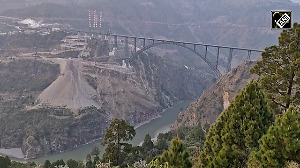How did the blockade end?
The information is from Delhi. The Naga Students Federation had a meeting with the prime minister and the home minister. They requested them to remove the blockade. But the home secretary (Gopal Krishna Pillai) supposedly threatened them. They were not very happy about it. So they made it a point to emphasise that they are doing it because the prime minister requested them to do so.
The NSF has said it is 'temporarily lifting' the blockade. What does it mean? What do you think are the terms?
There was no assurance from the Centre. It is a vague thing to say. It is just a way of surrendering, but couching it in better terms. They actually are lifting the blockade. I don't see them reinforcing it for a long time.
Why do you say they won't reinforce it for a long time?
I don't think so. Two highways serve Manipur: National Highways 39 and 53. NH 53 doesn't pass through Nagaland. It was partially opened. Some bridges on it were bad... weak. The government is trying to repair it in a big way. Except for a dam project on the way, which is likely to flood many of the bridges, this highway was more or less usable.
Thus, they (the NSF) know that ultimately a blockade will not succeed unless they are able to block all the highways. The Centre is now looking to repair NH 53, which also falls in the Golden Quadrilateral project, properly.
Is it totally safe for the movement of supplies or will rogue rebels cause a problem?
Supplies have started. Truckers who have been stuck in Assam will have to organise and come. But the fear of rogue elements will be there. Also, the National Socialist Council of Nagaland-IM is known for extortion.
In fact, that could also be one of the reasons that they did not find the blockade feasible. That revenue has gone. The minute they have enough money, they might be up to something. But there is no denying the fact that the blockade was definitely making a dent on their revenue.
Home Secretary G K Pillai said he would use the army to remove the blockade. But at the beginning of the blockade, he said it was a political problem and the Centre could not use the army...
I found it surprising he made such a vague statement. When someone blocks a national highway, it is a national problem. What about the other 'political problems'? This is in fact a humanitarian problem. I don't know why he said it. It is a law and order problem.
A national highway is federal property. They should have done something.
Why do you think the Centre took so long to move?
That is what is confounding. I think they were caught up in other problems like the Naxalite problem. And definitely, because Manipur is a peripheral state. Had it been in Haryana or somewhere, it would have been cleared in two days.
The Centre was too insensitive. A national highway is Union property. If it is a problem between Manipur and Nagaland, it should be settled bilaterally. Attacking Parliament, though it might be a different thing, but you understand that a national property is under attack, do you?
Are we soon going to see unrest return in some form or the other?
I think a lot of people have been embittered by this long impasse. The Centre has been sleeping for so long. But I don't see any immediate return to unrest.
What role does the state government now have? What does it have to do?
The state government will have to work on the issues. The elections to the autonomous district councils was the reason this blockade happened. The state government should identify places where there was no voting, and there were no candidates, and have repolling there.
The problem arose because the Nagas wanted the traditional system where there are chieftains who have the authority, and the state was pushing for an elected grassroots body.
Very broadly, the protest began because the Naga bodies wanted the traditional system to be provided with same powers as that of an elected body.
And then the state government should address the problem of the percentage of the Nagas and other tribes in the assembly.
Will (National Socialist Council of Nagaland-IM leader) Thuingaleng Muivah be allowed to travel to his village soon?
That I am not able to say. When there was some trouble in the run-up to the elections, the government saw Muivah's hand in the problem. Naturally that was the reason for the opposition. Now that the election is over, the state should make some kind of concession and allow Muivah.







 © 2025
© 2025